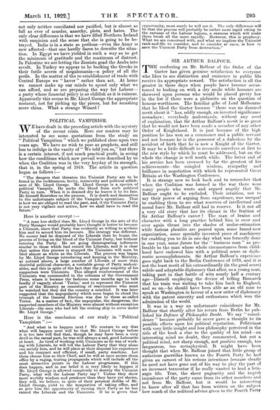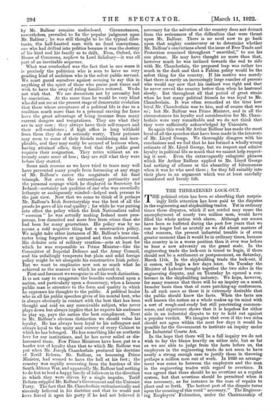SIR ARTHUR BALFOUR. T HE conferring on Mr. Balfour of the
Order of the Garter has given genuine satisfaction th everyone who likes to see distinction and eminence in public life receive its appropriate reward. The satisfaction is all the greater in these days when people have become accus- tomed to looking on with a dry smile while honours are showered upon persons who would be placed pretty low in the list if there were a plebiscite on the question of honour-worthiness. The familiar gibe of Lord Melbourne that he liked the Garter because there was no damned merit about it" has, oddly enough, an inverted significance nowadays ; everybody understands, without any need of explanation, that Sir Arthur Balfour's merit is so great that he would not have been made a member of any other Order of Knighthood. It is just because of the high position he has won as a commoner and a public servant and not because he is the possessor of a dukedom by the accident of birth that he is now a Knight of the Garter. It may be a little difficult to reconcile ourselves at first to the new style by which he must be addressed, but on the whole the change is well worth while. The latter end of his service has been crowned by far the greatest of his achievements—the mingled wisdom, sympathy and brilliance in negotiation with which he represented Great Britain at the Washington Conference. It is strange now to look back and to remember that when the Coalition was formed in the war there were many people who wrote and argued angrily that Mr. Balfour ought to be excluded. Their intuition, not to say their power of arguing from experience, was unequal to enabling them to see what reserves of intellectual and moral force Mr. Balfour still had in reserve. Is it not all a very old story that has its climax in the fruition of Sir Arthur Balfour's career ? The man of brains and character with a long practice behind him is over and over again thrust into the shades of under-estimation while furious plaudits are poured upon some brand-new organization, some specially invented piece of machinery for enabling you to do in one day what was formerly done in one year, some furore for the "business man" as pre- ferable to the man whose whole circumstances from child- hood have endowed him with a political sense or diplo- matic accomplishments. Sir Arthur Balfour's experience goes right back to the Berlin Conference of 1878, and it is not the least merit of his extraordinarily (in the good sense) subtle and adaptable diplomacy that after, as a young man, taking part in that battle of wits nearly half a century ago—Disraeli employing the device of telling Bismarck that his train was waiting to take him back to England, and so on—he should have been able as an old man to speak at Washington in favour of a new order of diplomacy with the patent sincerity and enthusiasm which won the admiration of the world.
It was in a way an unfortunate coincidence for Mr. Balfour that shortly after his return from Berlin he pub- lished his Defence of Philosophic Doubt. We say " coinci- dence " because probably he never gave a thought to its possible effects upon his political reputation. Politicians with very little insight and less philosophy perceived in the title of the book a clue to the quality of his mind—an interesting mind no doubt, they commented, but not a political mind, not sharp enough, not positive enough, too languorous, too metaphysical. It might have been thought that when Mr. Balfour joined that little group of audacious guerrillas known as the Fourth Party he had given an earnest of his serious intentions because clearly he need not have gone out of his way to play the part of an incessant tormentor if he really wanted to lead a leth- argic life. True, the sheer pugnacity and the impish impudence of the party came from its other members and not from Mr. Balfour, but it would be interesting to know after all that has been written on the subject how much of the political advice given to the Fourth Party by Mr. Balfour remains undisclosed. Circumstances, nevertheless. prevailed to fix the popular judgment upon Mr. Balfour he was still thought to be the typical. dila- tante, the half-hearted man with no fixed convictions, one who had drifted into politics because it was the destiny of his kind and his family so to drift. . Eton, Oxford, the House of Commons, nephew to Lord Salisbury—it was all part of an inevitable sequence. What was overlooked was the fact that in one sense it is precisely the politician who is seen to have no very goading kind of ambition who is the safest public servant. We must guard ourselves against seeming to say this in anything of the spirit of those who praise past times and wish to have the sway of ruling families restored. We do not wish that. We are democrats not by necessity but by conviction. At the same time he would be very blind who did not see at the present stage of democratic evolution that those whose acceptance of a political life is due to a tradition much more than to a personal craving for fame have the great advantage of being immune from many current dangers and temptations. They are what they are in any case ; they always have their self-respect and their self-confidence ; if high office is long withheld from them they do not seriously worry. Their patience may seem to some of their friends maddening and inex- plicable, and they may easily be accused of laziness when, having attained office, they feel that the public good requires their resignation. They retire without an ex- tremely acute sense of loss ; they are still what they were before they started.
Some such reasons as we have tried to trace may well have prevented many people from foreseeing at any stage of Mr. Balfour's career the magnitude of his final triumph. Not even the extraordinary pertinacity and the personal courage which he displayed as Secretary for Ireland—certainly not qualities of one who was essentially lethargic or ambiguously minded—helped such persons to the just view. Now that we come to think of it perhaps Mr. Balfour's Irish Secretaryship was the best of all the proofs he gave of his real quality ; for while he was putting into effect the policy which the Irish Nationalists called " coercion " he was actually making Ireland more pros- perous, less disunited and more free from crime than she had been for many generations. His policy was by no means a cold negative thing but a constructive policy. We might take other instances of Mr. Balfour's true cha- racter being forgotten or ignored and then rediscovered. His definite acts of military creation—acts at least for which he was responsible as Prime Minister—like the Committee of Imperial Defence and the Army Council, and his unfailingly temperate but plain and solid foreign policy might be set alongside his constructive Irish policy. But we want to emphasize now not so much what he achieved as the manner in which he achieved it.
First and foremost we recognize in all his work distinction. It is not easy to exaggerate the benefits conferred upon a nation, and particularly upon a democracy, when a famous public man is attentive to the form and quality in which he expresses his thoughts to the public. A political leader who in all his public speeches gives of his mental best, who is always obviously in contact with the best that has been thought and said on any conceivable subject, who never plays down but always implies that he expects his audience to play up, pays the nation the best compliment. Next to Mr. Balfour's obvious distinction we should value his loyalty. He has always been loyal to his colleagues and always loyal to the unity and secrecy of every Cabinet to which he has belonged. He has something like an aesthetic love for our institutions, and he has never soiled or dis- honoured them. Few Prime Ministers have been put to a harder test of loyalty than that to which Mr. Balfour was put when Mr. Joseph Chamberlain produced his doctrine of Tariff Reform. Mr. Balfour, on becoming Prime Minister, had seemed to have the ball at his feet ; the country was rapidly recovering from the burdens of the South African War, and apparently Mr. Balfour had nothing to do but to lead a happy family of followers in the direction in which they were driven by a single impulse. Tariff Reform crippled Mr. Balfour's Government and the Unionist Party. The fact that Mr. Chamberlain enthusiastically and sincerely believed in his doctrine and that he would not have forced it upon his party if he had not believed it necessary for the salvation of the country does not detract from the seriousness of the difficulties that were thrust upon Mr. Balfour. There is no need now to go back upon that mighty controversy or to determine whether Mr. Balfour's convictions about the issue of Free Trade and Protection remained throughout "unsettled," to use his one phrase. He may have thought no more than that, however much he was inclined towards the end to side with Mr. Chamberlain, the proposed leap was rather too much in the dark and that a Fabian policy would be the safest thing for the country. If his motive was merely that there is surely an increasingly large number of persons who would say now that his instinct was right and that he never served the country better than when he hastened slowly. But throughout all that period of great strain when he lost many political friends he was loyal to Mr. Chamberlain. It was often remarked at the time how loyal Mr. Chamberlain was to him, and of course that was so ; but Mr. Balfour was Prime Minister, and in all the circumstances his loyalty and consideration for Mr. Cham- berlain were very remarkable and we do not think that they were sufficiently acknowledged by Unionists. So again this week Sir Arthur Balfour has made the most loyal of all the speeches that have been made in the interests of Mr. Lloyd George. We thoroughly disagree with his conclusions and we feel that he has formed a wholly wrong estimate of Mr. Lloyd George, but we respect and admire loyalty in political life so much that we cannot help respect- ing it now. Even the extravagantly eulogistic phrases which Sir Arthur Balfour applied to Mr. Lloyd George had nothing of offence or the absurdity of fulsomeness when it was he who used them for they fell suitably into their place in an argument which was at least carefully considered and keenly felt.



































 Previous page
Previous page